Paris
Saturday, November 24, 2007 - Palais Garnier
A DIAMANT AT THE OPERA
This afternoon, under the sunny sky of Paris, as from 3 pm, there is already many people on the square of the Garnier Palace. At the bottom of the staircase, an orchestra, made up of young talented musicians and overflowing of energy, plays stirring melodies. In the hall of the Opera, an unusual atmosphere reigns. Rameau, Lulli, Gluck and Haendel, well seated on their stone armchairs, wonder: « Which famous character can be the cause of all these comings and goings? Why, so many people, such a swarm of bees, congregate around a book with open pages? »
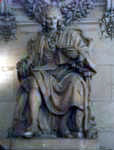
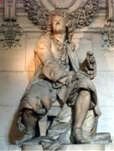
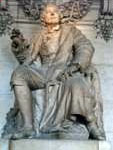
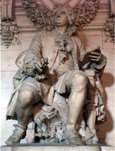
Quite simply, these are the faithful Nana fans, who, come from a little of everywhere in the World, dedicate the golden book which will be given to her tonight. In fact, a second golden book will be necessary in order to allow everyone to put on paper their feelings and their thanks for all these years of sharing.
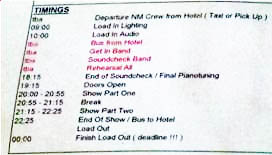
Now, it is the moment to wait Nana’s arrival. To get there, we have to leave the hall, descend the square steps and skirt round the building. In the back is parked an imposing truck registered in Germany. It conveys all the technical material for the November 2007 tour (Germany - Belgium - Luxembourg - Switzerland - France). A small poster, stuck on the windshield, specifies today’s planning. Only unknown information: the hour of arrival of Nana and the musicians.
Some people gather in the little yard at the entrance for technicians and artists. A guard, charged to supervise the access, makes us believe nicely that Nana will arrive by another door, but quickly, he confirms that we are at the right place. Towards 4:30 pm, a beautiful limousine arrives in the yard. The driver drops Nana, her sister Jenny and André. Nana takes refuge quickly inside the building, because the weather is a bit cold. It is nevertheless the opportunity to say some warm words and offer her some gifts. Of course, some are disappointed not to obtain dedications, but Nana may not catch cold, it would be disastrous for her voice.
As we are back in the hall, we notice that people continue to write double-quick messages in the golden book. Unfortunately, not everyone will be able to do this before the opening hour of the doors. At 7:15 pm, the crowd hurries to reach the steps of the theatre. It is time to climb the famous staircase, the one in the photo in the album "Classical". Everything is amazement to the eyes. Everywhere, it is only marble, chandeliers, mosaics, gildings, sculptures, paintings, hangings, an aesthetic exhilaration. The mirrors extend dimensions, the balconies give punging and vertiginous views.
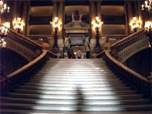
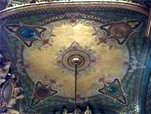
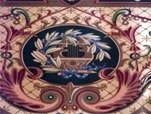
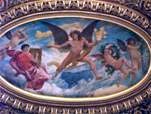
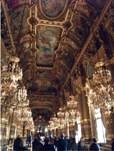
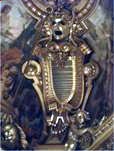
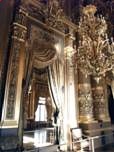
The magic continues when we get into the concert hall. The theatre seems small in spite of its 1,700 seats. The 7-ton chandelier shines in all its brightness. It illuminates the famous ceiling painted by Marc Chagall in 1964. The painter wanted to pay tribute to 14 famous composers (Moussorgski, Mozart, Wagner, Berlioz, Rameau, Debussy, Ravel, Stravinski, Tchaïkovski, Adam, Bizet, Verdi, Beethoven and Gluck).
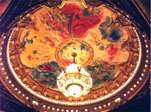

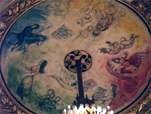
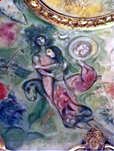
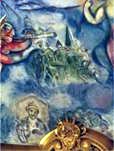
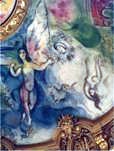
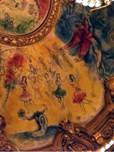
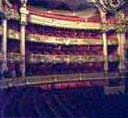
The armchairs are with red as the dominant, color originaly chosen for its rosy reflections, which give to the women more youthfullness and radiance. These women caused a mini-revolution on January 5, 1875, at the time of the inaugural performance when Charles Garnier had an ovation. (It should be noted that he had not been invited and had to pay his for his box!) Indeed, this evening the Queen of Spain at the front, these ladies dared to leave their boxes at interval to invest the galleries, previously inconceivable behaviour.
Towards 8 pm, the hall darkens and Mr Lévon Sayan comes to present the concert: « This place that I occupy here tonight is a proxy made by our great friend Jean-Claude Brialy to whom we all think of. He loved Nana to distraction, passionately the theatre and we are in the most prestigious. You have come to pay tribute to Nana Mouskouri, a woman who, while spreading musical notes throughout the world, never lost her roots. She has more than anybody the sense of Humanity and the sense of the Heart. She wished that this concert be for the Foundation’s benefit Hôpitaux de Paris – Hôpitaux de France chaired by Mrs Bernadette Chirac whom I invite to speak. »
« Dear Nana, you are a great artist. In the whole world, your public is faithful to you for so many years. Our mutual friend, Jean-Claude Brialy, would have liked so much to be with us tonight, he who wanted to unite your immense talent and the cause I defend in favour of the hospitalized children and teenagers. Our action consists to undramatize the child’s stay, to make it more pleasant. When the child feels almost at home, when he is less anxious, all the doctors say it is easier to look after him and that hastens his recovery. Then, dear Nana, with all of my heart, a big Thank You. Your world tour is a very big success. Your book of memories and your triple album with old and new songs gives happiness to your numerous fans. It is a fair reward for an exceptional journey and it is not the public present tonight in this splendid Garnier Palace who will contradict me. Dear Nana, on behalf of myself, I thank you for all the pleasure that you give us and, in the name of the Foundation Hôpitaux de Paris – Hôpitaux de France, I renew to you my intense gratitude for your generosity, my great admiration and my very great affection. »
The public acknowledges these statements and demonstrates its impatience with a thunder of applause. At this moment a videorama, accompanied by a 7 minutes instrumental, relates the international career of Nana.
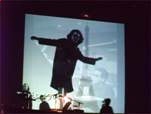

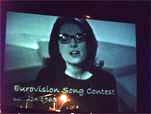
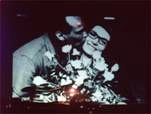
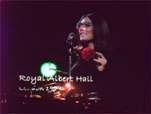
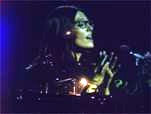
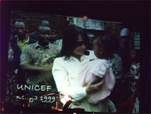
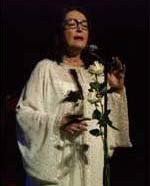
Continuing applause greets the arrival of the musicians and the end of the video. Nana immediately appears dressed with a superb tunic that covers her white dress. The public gives her a standing ovation which obliges her to delay the beginning of "Tora pou pas stin xenitia". From this moment, we know that the evening will be exceptional. After "Adieu Angelina" with its very beautiful and new orchestration, Nana welcomes her fans and thanks them for their presence. With a lump in her throat, she recalls her very great friend Jean-Claude Brialy who was the instigator of this benefit concert and who will not have been able to attend: « He is with us and as he is someone who did not like the farewells, it will not be a sad evening, but full of emotion and Love. We will get through parts of my life with some songs that you know. »
Remembering her youth, Nana recalls the small stage of the open air cinema in Athens where she started to dream of becoming a singer. Her mother, who had a very beautiful voice, helped her discover many songs from various European countries like: "La paloma", "O solo mio" and "Parlez-moi d’amour". Nana also mentions a memorable musical experience of her beginnings: « In 1962, thanks to Mr Hazan who made me come to Paris two years before, I flew for the first time to New York. There, I recorded an album with Quincy Jones. One of these songs was... "Smoke gets in your eyes". »
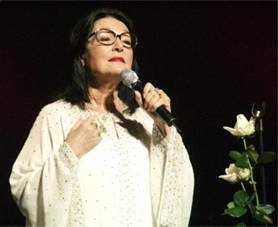
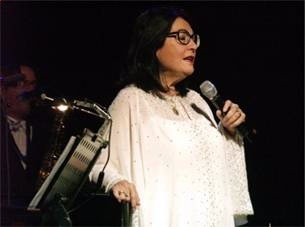
"La vie, l’amour, la mort", one of my favourite French songs, if not my favourite, allows Nana to show all the dimension of her immense talent of performer. The voice is splendid. Shivers of emotion invade me. The public gives her a second standing ovation, cheers burst forth. What a joy to be here! Nana recalls the memory of her friend Nikos Gatsos, Greek poet. She offers us an immense gift while singing "Mia fora ki enan kairo", a song full of emotion, delicacy and which speaks about truth. "Je chante avec toi liberté" has all its solemnity in this prestigious place which is the Opera. It is like a return to the source. Verdi can be proud with the adaptation of "Va, piensero", the famous Hebrew’s choir from his Nabucco. The first part ended in apotheosis with the extraordinary interpretation of "Le ciel est noir", a song that Nana has included in all her farewell concerts, everywhere in the world, and that earns her each time a standing ovation.
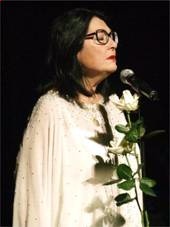
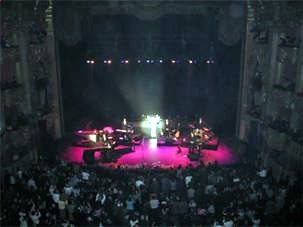
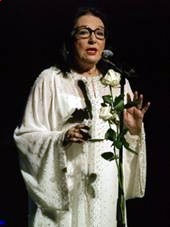
Towards 9:30 pm, the musicians arrive on stage. Marc, the percussionnist, absent during the first part, joins Christophe, Hervé, Philippe, Yannick and Luciano. Nana is back with a new stage dress, white dress and tunic. "Tous les arbres sont en fleurs" and "Pauvre Rutebeuf" open the second part of the concert. We cannot have a better dream! And Nana continues with her anecdotes: « I met many friends in my life and some wrote me songs. Jean-Claude Brialy told me one day that we must never forget where we come from and he wrote me this song... "Où es-tu passé?". » |
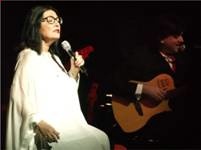 |
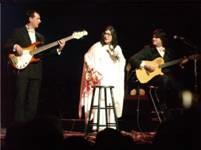
While she invites the public to sing with her, Nana tries to sit down on her stool, but her tunic prevents her from being well settled. She says with humour that it is like that each evening. It is true that in Liege, she had the same problem. She told us that she did not want the same incident as that which happened to Marlene Dietrich. While overcome by vertigo on the stage, she had fallen into the orchestra pit. She was not badly hurt and the following evening, she had performed her show sitting in a wheel chair... Once well settled, Nana offers us a sublime medley of her hits like "Plaisir d’amour", "Guantanamera" and "Quand tu chantes".
After a new standing ovation, Nana introduces the technicians and the musicians. Then she sings "L’enfant au tambour", "L’amour en héritage" and "Milisse mou" that adds a lot of atmosphere in the hall. Before continuing the musical voyage, Nana adds: « As I said at the beginning of our concert, my dad was a cinema projectionist. All the movies I saw in my youth filled me with joy and dreams. Later, I worked with Michel Legrand and we recorded an album which is like a tribute to my parents. Here are some of these songs... "Les parapluies de Cherbourg", "The summer knows", "Les feuilles mortes" and "Over the rainbow". »
This musical rainbow is once more greeted by a standing ovation interrupted by the first notes of "Come and sing". After a sham exit, Nana comes to finish the song. To greet everyone, she turns toward the side boxes from the stage and in particular the n°5, stage right, the one of the famous Phantom of the Opera who might also have appreciated this masterly concert. Suddenly, hip hip hip hourra burst forth as at the time of Musicorama in January 13, 1969 and of Olympia in October 13, 2002. |
 |
Nana smiles and answers: « I thank you from the bottom of my heart. It is me who wants to shout hip hip hip hurrah. I thank infinitely Jean-Claude Brialy and all those who allowed that this dream be carried out. My sister Jenny and my daughter Lénou, who are here tonight, know very well that it was the dream of my parents that I became an Opera singer. I did not succeed, but I always had a lot of respect and Love for music and I always tried to return it. » Nana also thanks the people in charge of her record company to whom she is faithful for 47 years, a record without any doubt: « If I made an international career, it is because of them. They helped me to build it. Thank you to Pascal Nègre who is with us tonight. »
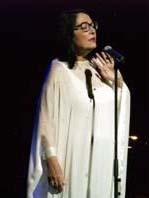
The concert draws to a close and Nana addresses her public for the last time: « I would like to sing you my first song, the one I sang 49 years ago. It is a song from my friends Manos Hadjidakis and Nikos Gatsos. It speaks about truth and faith: The moon is made of paper and the shore is fake. But, if you would believe a little in me, all that could become reality... ». The public holds its breath, listens religiously to "Hartino to fengaraki". Nana moves away from the microphone, stares at the boxes, on her left, then on her right. I imagine that she will move forward and sing without the microphone, because her voice and the hall configuration allow it, but she does not dare to do it. At the end of the song, it is such a thunder of applause that we hardly hear her saying: « Thank you Paris, Thank you France." She leaves the stage, but the public does not want to leave it at that.
What follows is extraordinary. I had never experienced it since 1971, date of my first meeting with Nana and my first concert. More than ten minutes of calls back with « bravos », « une autre » (another one) that burst forth everywhere. Nana returns to wave several times. The intensity of the calls to return does not weaken and the fans scream: « Nana, Nana, Nana ». When she returns on stage, she is welcomed by « ho ho-ho-ho ho, ho ho-ho-ho ho ». The public shouts: « Thank you, thank you » and she offers us a splendid "Ave Maria". During the ultimate waves, Luciano and Yannick join her. Nana has gestures of gratitude and affection towards them. Indeed, she leans her head alternatively against the shoulder of one and then the other. She is radiant with happiness. How beautiful this is to see! |
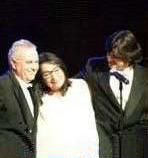 |
To conclude, I would like to thank Nana for having offered us such an exceptional collection of songs and for having made us live extraordinary moments which will remain engraved forever in our memories. During 2 hours and 30 minutes, a wave of emotion crossed the hall. The communication between Nana and us was so strong that tears often came to our eyes.
SUCH A DIAMOND WITH THE MULTIPLE MUSICAL FACETS, NANA ILLUMINATED THE TEMPLE OF THE LYRIC ART.
|
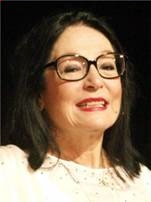
She gave us so much during all these years of sharing.
We will always like her. We will miss her.
Our only regret will be not having been able to find the ideal time - we tried several times, but we were covered by the applause - to sing to her "Roses blanches de Corfou" as we had prepared. But that would have, perhaps, broken the harmony of the concert. Some people tried to sing at the very end, but it was a little late.
With friendship.
Christian Langlais
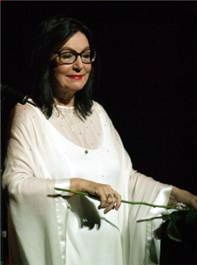
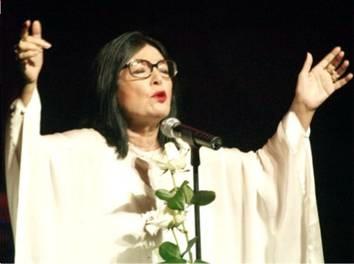
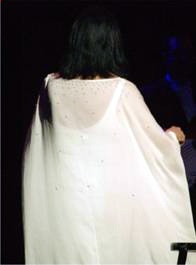
First part : 01- Intro (video)
|
Second part : 16- Tous les arbres sont en fleurs |